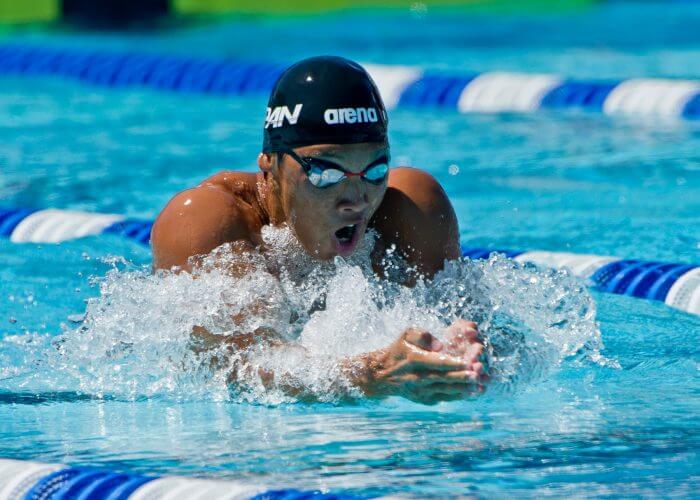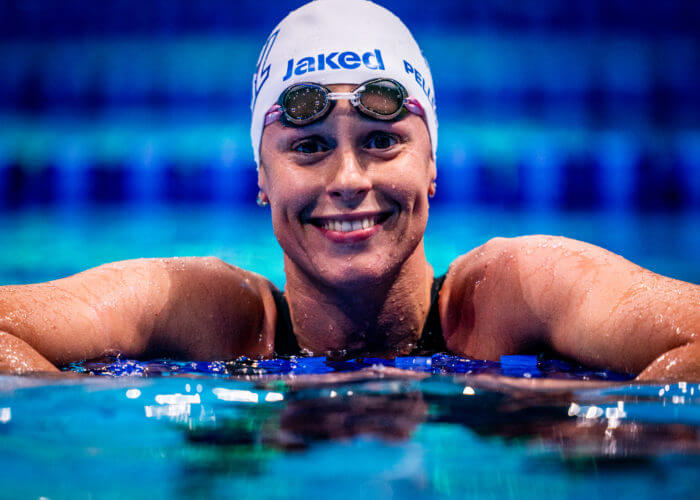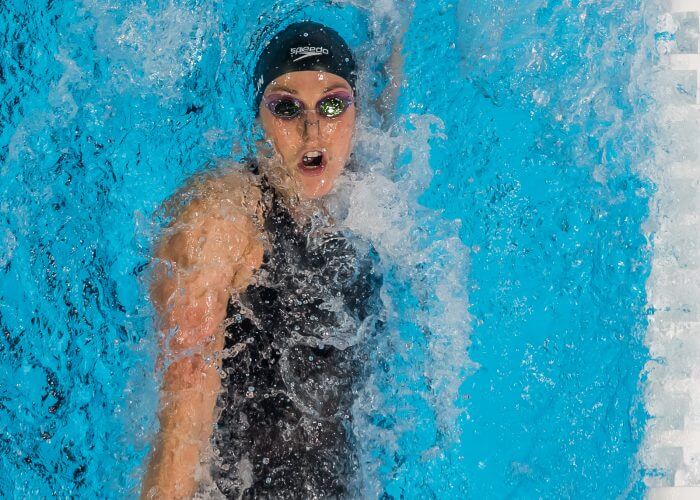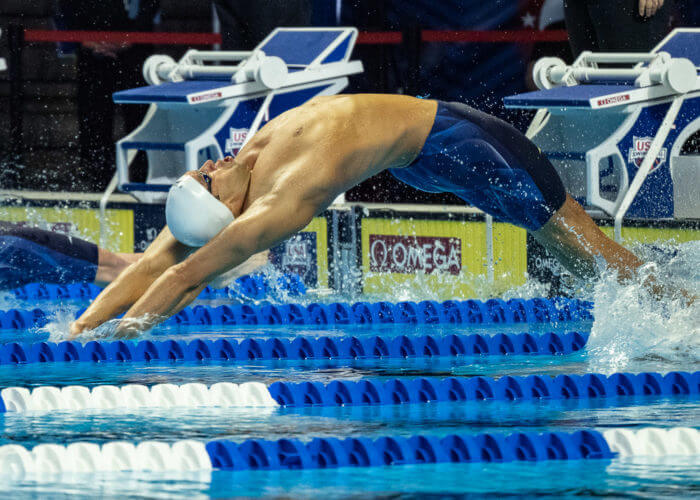A Prelude to Paris? What Do World Championships Mean Ahead of the Olympic Year?
A Prelude to Paris? What Do World Championships Mean Ahead of the Olympic Year?
The swimming world is only a year out from the 2024 Paris Olympics. What does it all mean?
Less than two years have passed since the final swims of the Tokyo Olympics, but thanks to the one-year delay of those Games prompted by the COVID-19 pandemic, we have already reached the final countdown for the Paris Olympics, with the opening ceremony set for July 26, 2024, and the swimming competition scheduled to begin the next day.
Before that, the 2023 World Aquatics Championships will serve as something of a dress rehearsal for the Games, albeit with one less day of racing (eight, compared to nine in Paris) and with seven more events (42 instead of the Olympic program’s 35).
This year’s Worlds will return to Fukuoka, Japan, and the Marine Messe, the same site as the 2001 edition of this meet, serving various roles for the world’s best swimmers. It’s an all-important global championship meet, but also a tuneup for the event set to take place one year later. It’s not that the results of Worlds don’t matter, but if something goes wrong, it’s not the worst-case scenario. The Olympics only take place every four years, with the entire world watching, while the every-two-years (usually) World Championships feature a fraction of the audience.
Maybe a swimmer is trying out some changes in training, technique or the taper process. Well, the Fukuoka Worlds provides a testing ground to gauge whether those new strategies are working out. If not, there’s plenty of time to return to what works in time to prepare for the Olympics.
This year’s Worlds will also be the first time since 2019 that swimmers have raced in front of a full arena, with upwards of 10,000 spectators after the 2021 Games were held without spectators (aside from the competing teams) and the 2022 edition of the World Championships was held in a 5,000-seat arena. So in Fukuoka, swimmers will experience similar nerves and emotions to what they can expect walking out for an Olympic final.
A PORTENT OF THINGS TO COME?
The best guide to the importance of results at the one-year-out-to-the-Olympic-Games World Championships is a historical comparison. Of course, the most recent Olympic cycle does not apply because of the Tokyo delay, but the four prior Olympics were preceded immediately by a global gathering at Worlds.
Who has made the jump from World Championships excellence to Olympic glory? That list, of course, is headed by Michael Phelps.
2003

Photo Courtesy: Peter H.Bick
The first of Phelps numerous multi-gold-medal performances came at the 2003 Worlds in Barcelona, where he notched gold medals in the 200 meter butterfly, 200 IM and 400 IM, all in world-record time. His only individual miss was the 100 fly, where Ian Crocker pulled off an upset win that would begin the years-long rivalry in the event between the two Americans. Additionally, Aaron Peirsol pulled off his first 100-200 backstroke world-title sweep, and Kosuke Kitajima set world records in both breaststroke events.
And what happened one year later at the Athens Olympics? Phelps won all three of those events along with the 100 fly, getting the better of Crocker in a stunning come-from-behind finish, while Peirsol swept the backstrokes and Kitajima the breaststrokes.
2007

Photo Courtesy: Mine Kasapoglu / ISL
Phelps again made history at the 2007 World Championships, his seven-gold-medal performance serving as a prelude to the famous eight-for-eight effort 16 months later in Beijing. But also at that meet in Melbourne, Ryan Lochte won his first individual world title by upsetting Peirsol in the 200 back, and he would go on to pull away from Peirsol on the final length to win Olympic gold as well. South Korea’s Park Tae Hwan won his first individual world title in the 400 free before winning Olympic gold one year later, and Tunisia’s Ous Mellouli touched first in the 800 free, and although the title was stripped because of an anti-doping violation, he would return to golden form in the 1500 free in Beijing.
But while the correlation between 2007 Worlds and 2008 Olympic results was significant among the men, only three of the 13 individual women’s events had the same winner in 2007 and 2008. At the latter meet, Australia’s Stephanie Rice, Germany’s Britta Steffen, Great Britain’s Rebecca Adlington, Italy’s Federica Pellegrini, China’s Liu Zige and the USA’s Rebecca Soni all won major international gold for the first time. Liu and Soni had not even been present at the 2007 Worlds, and Adlington did not make any finals at that meet.
2011

Photo Courtesy: Peter H. Bick
When the world’s top swimmers returned to China for the 2011 World Championships in Shanghai, six swimmers won their first individual world titles in a setup for golden swims one year later: on the men’s side, that included China’s Sun Yang and Hungary’s Daniel Gyurta, while the women’s list included Chinese swimmers Ye Shiwen and Jiao Liuyang plus Americans Dana Vollmer and Missy Franklin.
Some of those swimmers—Gyurta, Jiao and Vollmer in particular—were already accomplished international performers making a breakthrough, but this meet was Franklin’s first international shining moment. On the fifth night of competition, she followed up an unexpected bronze in the 50 backstroke with a 1:55.06 leadoff leg of the American women’s 800 free relay, faster than the winning time in the individual event (in which Franklin had not been entered). Two days later, Franklin dominated the 200 back final for her first world title, and as a result of her stellar swimming, she got the nod to anchor the U.S. women’s 400 medley relay, which also won gold.
2015
Finally, the 2015 World Championships was the setup for Katie Ledecky’s sweep of the 200, 400 and 800 freestyle races one year later in Rio. The 2015 meet in Kazan was the first time Ledecky raced the 200 free at a major meet, and the decision paid off in a gold medal in a hotly contested final. That meet was the precursor for what Ledecky could accomplish on the international stage.
Kazan was also the site of Adam Peaty’s first major competition, and he won gold medals in the 50 and 100 breaststroke. Also in 2015, Gregorio Paltrinieri earned the first of his four major gold medals in the 1500 free.
NO GUARANTEE
So it’s clear that the year-before edition of the World Championships can launch international careers in dramatic fashion, propelling a swimmer to even greater heights on the Olympic stage, but by no means is the link absolute. Plenty of swimmers have fallen off in the year leading up to the Games, while others have emerged or resurged. There was the long list of rapid ascendances at the 2008 Olympics, and four years later, a whopping 11 swimmers won Olympic gold medals having never before won an individual world title.

Photo Courtesy: Peter H. Bick
In fact, four gold medals in London came from swimmers not even present at the 2011 Worlds: Americans Matt Grevers (100 back) and Allison Schmitt (200 free) were returning to major competition after missing out the year before while Ruta Meilutyte (100 breast) and Ledecky (800 free) were only 15 at the time of their Olympic breakout performances, with neither having ever raced before at a senior-level international event.
The American team, almost always the group that finishes major meets atop the medal podium, has underperformed compared to expectations at two consecutive year-before World Championships (2015 and 2019), and the typical procedure is for USA Swimming to select a team for these meets one year in advance.
The logic for that decision is that the World Championships are a testing ground, a tuning-up meet, and the swimmers are better off for the Olympic summer without having to prepare for both a qualifying meet and international competition the year before. The process has worked out in Olympic medal success, but definitely at the cost of some World Championships medals.
USA Swimming is not using that sometimes-awkward selection process in 2023, largely thanks to the COVID pandemic and condensed racing calendar in this current three-year “quad.”
* * *
One potential cloud hovering over this year’s Worlds is the status of Russian swimmers, currently locked out of international competition because of their country’s invasion of Ukraine. That ban is expected to remain in place through this summer, but the status of Russian swimmers for Paris remains unclear.
For those swimmers who do race in Fukuoka—and even for the swimmers who race in national qualifying meets for Fukuoka—valuable international medals will be on the line, and they will get a chance to collect data to assess their preparation, just in time to do it all over again in the final sprint to Paris.



